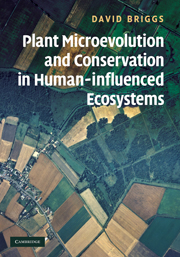Book contents
- Frontmatter
- Contents
- Preface
- Acknowledgements
- List of abbreviations
- 1 Introduction
- 2 Studying change
- 3 Key concepts in plant evolution
- 4 The origin and extent of human-influenced ecosystems
- 5 Consequences of human influences on the biosphere
- 6 Categories
- 7 Investigating microevolution in plants in anthropogenic ecosystems
- 8 Plant microevolution in managed grassland ecosystems
- 9 Harvesting crops: arable and forestry
- 10 Pollution and microevolutionary change
- 11 Introduced plants
- 12 Endangered species: investigating the extinction process at the population level
- 13 Hybridisation and speciation in anthropogenically influenced ecosystems
- 14 Ex situ conservation
- 15 In situ conservation: within and outside reserves
- 16 Creative conservation through restoration and reintroduction
- 17 Reserves in the landscape
- 18 Climate change
- 19 Microevolution and climate change
- 20 The implications of climate change for the theory and practice of conservation
- 21 Overview
- References
- Index
4 - The origin and extent of human-influenced ecosystems
Published online by Cambridge University Press: 05 June 2012
- Frontmatter
- Contents
- Preface
- Acknowledgements
- List of abbreviations
- 1 Introduction
- 2 Studying change
- 3 Key concepts in plant evolution
- 4 The origin and extent of human-influenced ecosystems
- 5 Consequences of human influences on the biosphere
- 6 Categories
- 7 Investigating microevolution in plants in anthropogenic ecosystems
- 8 Plant microevolution in managed grassland ecosystems
- 9 Harvesting crops: arable and forestry
- 10 Pollution and microevolutionary change
- 11 Introduced plants
- 12 Endangered species: investigating the extinction process at the population level
- 13 Hybridisation and speciation in anthropogenically influenced ecosystems
- 14 Ex situ conservation
- 15 In situ conservation: within and outside reserves
- 16 Creative conservation through restoration and reintroduction
- 17 Reserves in the landscape
- 18 Climate change
- 19 Microevolution and climate change
- 20 The implications of climate change for the theory and practice of conservation
- 21 Overview
- References
- Index
Summary
Human-influenced ecosystems are the arena for contemporary microevolution, and the increasing spread and intensity of human activities are major concerns for conservationists. It would be possible to assume that the historical and contemporary effects of human influences are so widely understood and appreciated that only a few paragraphs are needed at this point in the book. However, such an approach would fail to set the scene adequately for what follows. In a brief historical review, this chapter examines several major issues: (a) the environmental consequences of inexorable rise of human populations; (b) how changes in agriculture and technology have led to abrupt and gradual environmental transitions; and (c) how human activities have resulted in the widespread introduction of plants and animals into new areas across the globe. This chapter also considers the rise of public concern about the profound human impacts on the world's vegetation, animal resources and soil, leading to the development, in the post-Second World War period, of increased environmental awareness, focusing on human population growth (now at over 6 billion and projected to rise), habitat destruction, over-harvesting of natural resources, the extinction of species, the impact of pollution and the dramatic consequences of the widespread introduction of alien species across the world.
The origin of humans
Weber (2005) notes that only about 10% of the population of the USA fully accept a Darwinian explanation of the origin of humankind, many believing that the world and its plants and animals are of very recent origin.
- Type
- Chapter
- Information
- Publisher: Cambridge University PressPrint publication year: 2009



